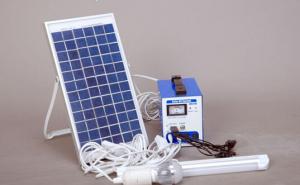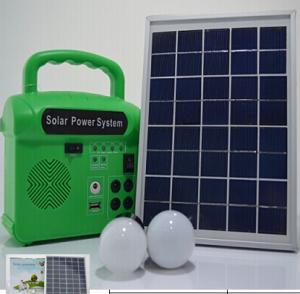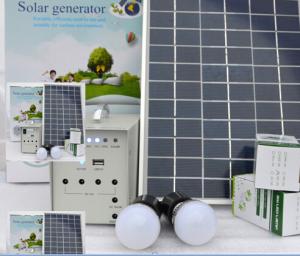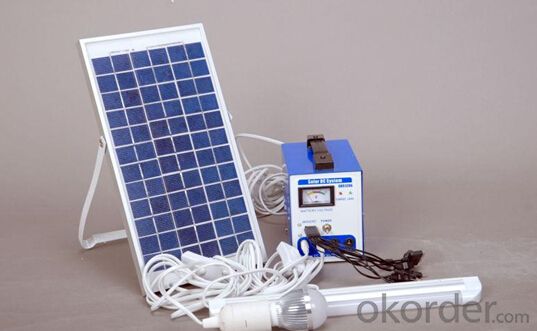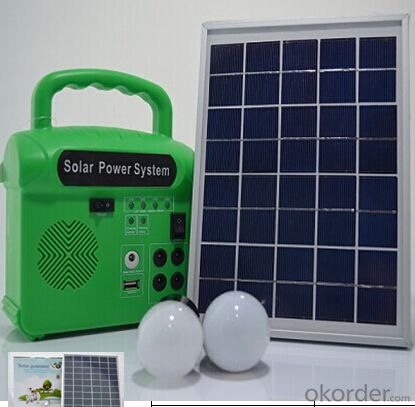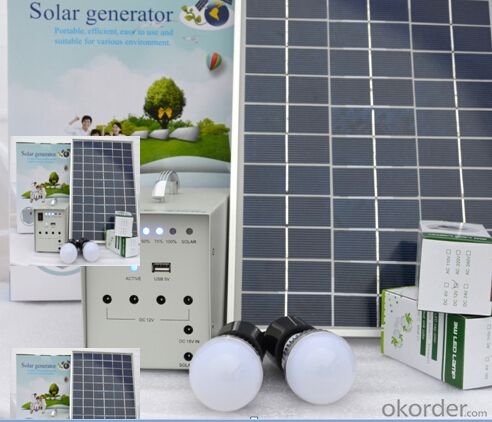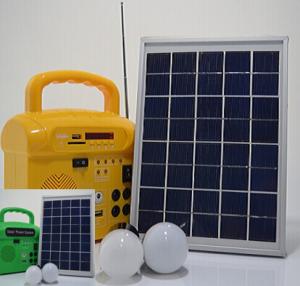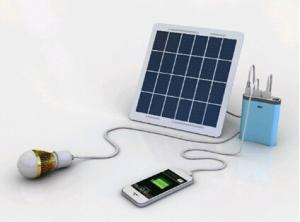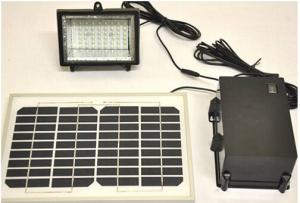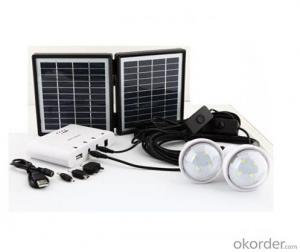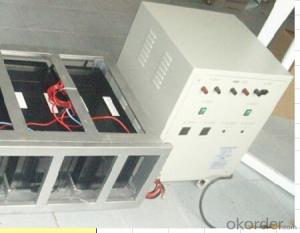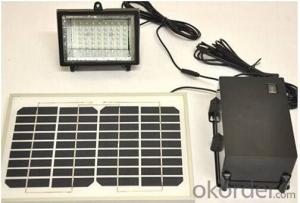Solar Energy Systems Nappanee - CNBM Solar Home System Roof System Capacity-30W
- Loading Port:
- Shanghai
- Payment Terms:
- TT or LC
- Min Order Qty:
- 300 pc
- Supply Capability:
- 10000 pc/month
OKorder Service Pledge
OKorder Financial Service
You Might Also Like
Introduction of our company
We are the first solar racking system developer in China, who committed to solar racking system R&D, producing and marketing for about 10 years. We were the OEM for Sunpower, and are one of the largest rooftop solar racking system supplier in Japan and Australia now.
We persists in taking the path of specialization, scale and internationalization development. We import the international advanced technology equipment for manufacturing , assembling and testing. Frontier solar racking system is with own patents. The dynamic wind resistance reliability of our racking system can up to 270km/h. Therefore, superior product quality with more than 25 years' durability and perfect after-sale service have earned us a high reputation in PV industry worldwide.

Working Principle of Solar Roof System
The stand alone Solar Home System is an off-grid solar system which uses batteries to store the solar energy. Stand alone solar system solutions design for those who are not able or willing to connect to electricity grid.
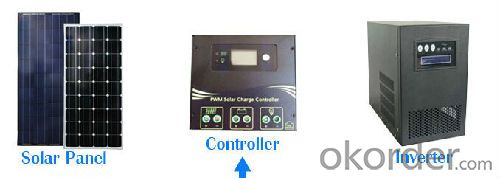
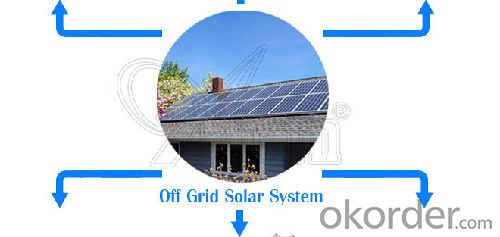

Specification of Solar Home System
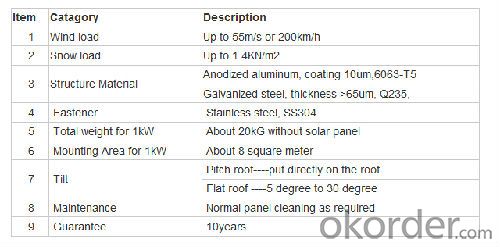
Product Features of Solar Home System
Off grid solar power system is mainly used for application with relatively-small power consumption, and the areas have no grid network coverage, or grid power is unstable or outage condition.
It’s composed of solar panels, hybrid solar inverter, battery bank, solar panel mounting racks, and other accessories required fora complete home solar power system.
The battery bank gives a stable power output to the solar inverter which converts DC to AC to power loads, and provides power backup in rainy or cloudy days.
The solar panels generate electricity at daytime and charge the battery bank.
The off grid home solar power system provides grid power bypass in case of battery power shortage when sunshine is not enough.
All the off grid home solar power system configurations are worked out by scientific calculation and design.
Advantage of Our Solar Home System
1.Safety and easy installation,Plug and play systems;
2.Good quality panel to ensure the high efficiency and long life needs;
3.Solar Automatic lighting controller :with adjustable run times, over-current protection;
4.Solar Batteries: Maintenance free, long life batteries
5.Lighting Source: LED lamp /Lantern (Fixed/Movable)
6.Flexible designs per client requests;
Terms and Conditions
1. Trade terms: FOB Shanghai
2. Payment terms: 30% T/T, balanced before shipment/ LC at sight before shipment. Actual Terms can be negotiated for big order.
3. Package: Exported standard package suitable for tough handling and sea transport.
4. Delivery: Goods to be ready within 10~30 days depending on order quantity.
5. Warranty: 10 years for solar panel, 2 years for controller/inverter/battery.
FAQ
Q: Could you introduce the background of your company?
A: We are a Group corp. with 1GW capacity in China, which is Okorder’s registered VIP Supplier, possess Financial Service from Okorder.com.
Q: Required mainly certificates (CE&IEC/TUV/RoHS)?
A: Our products are certificated by CE RoHS, IEC, ISO, TUV, UL etc.
Q: Your main exported market is?
A: Main markets of our products is: South-east Asia, Mid-east, Arica, East Europe and Latin America.
- Q: Are there any disadvantages to installing a solar energy system?
- Yes, there are a few disadvantages to installing a solar energy system. Some of the main drawbacks include the high upfront cost of installation, the need for sufficient sunlight to generate optimal power, and the requirement for ample space to accommodate the solar panels. Additionally, solar energy systems can be less efficient during cloudy or rainy periods, and their production may not align with peak energy demands. Finally, the maintenance and occasional replacement of components can be costly and time-consuming. Despite these disadvantages, the long-term benefits and environmental advantages of solar energy make it an increasingly popular and viable option for many households and businesses.
- Q: I want to install a full set of domestic solar heating equipment does not know how much money to spend, please.
- Save 50% equivalent to an annual savings of more than 3300 heating projects; water consumption in accordance with an average of 200 liters a day, remove the winter has been deducted 120 days, the remaining 240 days probably with hot water total: 48 tons, natural gas energy is calculated according to the cost of the cheapest words per ton of hot water heating costs 15 yuan, annual water savings of 720 yuan. Two of the total savings of 4000 yuan, according to the energy prices coefficient is estimated at less than 10 years to recover the full investment, another ten years of savings more than 40 thousand yuan.
- Q: Can solar energy systems be used in powering veterinary clinics or animal shelters?
- Yes, solar energy systems can definitely be used to power veterinary clinics or animal shelters. Solar energy systems, such as solar panels, harness the power of sunlight and convert it into electricity. This electricity can be used to power various electrical appliances and devices, including those found in veterinary clinics and animal shelters. By installing solar panels on the roof or in an open area near the veterinary clinic or animal shelter, these establishments can reduce their dependence on traditional electricity sources and utilize clean and renewable solar energy. Solar power can be used to run equipment such as lights, heating and cooling systems, medical equipment, refrigerators for vaccines and medications, computers, and other essential devices. Furthermore, using solar energy systems can help these establishments save on electricity costs in the long run. Veterinary clinics and animal shelters often consume a significant amount of electricity due to the nature of their operations, such as maintaining proper temperature and lighting conditions, running medical equipment, and maintaining a comfortable environment for animals and staff. By utilizing solar power, these establishments can significantly reduce their electricity bills, allowing them to allocate more resources towards animal care and welfare. Additionally, using solar energy systems in veterinary clinics and animal shelters aligns with their commitment to environmental sustainability. By reducing reliance on fossil fuels and utilizing clean and renewable solar energy, these establishments can contribute to reducing carbon emissions and minimizing their ecological footprint. In summary, solar energy systems can be used effectively in powering veterinary clinics and animal shelters. They provide a reliable and sustainable source of electricity, reduce operating costs, and demonstrate a commitment to environmental responsibility.
- Q: Can solar energy systems be used in areas with high levels of dust or dirt?
- Yes, solar energy systems can be used in areas with high levels of dust or dirt. However, it is important to regularly clean and maintain the solar panels to ensure optimal performance. Dust and dirt accumulation on the panels can reduce their efficiency, but with proper maintenance, solar energy systems can still effectively generate electricity in such areas.
- Q: Can a solar energy system be installed on a retail store or restaurant?
- Absolutely! It is entirely possible to install a solar energy system on a retail store or restaurant. As a matter of fact, numerous businesses within the retail and restaurant sector have already embraced solar power as a means to both decrease their energy expenses and contribute to a sustainable future. A store or restaurant can have solar panels installed on either its roof or parking lot, making the most of the abundant sunlight typically received in these locations. By harnessing the power of the sun, these establishments can generate clean and renewable energy to fulfill their electricity requirements. Moreover, the installation of a solar energy system can also yield various benefits, including tax incentives, lowered energy bills, and the establishment of a positive brand image that showcases the business's dedication to sustainability.
- Q: What is the role of disconnect switches in a solar energy system?
- The role of disconnect switches in a solar energy system is to ensure the safety and efficient operation of the system. These switches allow for the isolation of the solar panels or inverters from the electrical grid, providing a means to disconnect the system in case of maintenance or emergency situations. They also help in preventing electrical shocks and fires by interrupting the flow of electricity and isolating different components of the system.
- Q: Can solar energy systems be used for transportation purposes?
- Yes, solar energy systems can be used for transportation purposes. Solar-powered vehicles, such as solar cars, boats, and planes, have been developed and used to demonstrate the feasibility of solar energy for transportation. Solar energy can also be used to power electric vehicles, either through direct charging or by charging the vehicle's battery using solar panels. Additionally, solar energy can be harnessed to power charging stations and infrastructure for electric vehicles, enabling sustainable and renewable transportation solutions.
- Q: How much space do I need for a solar energy system?
- The amount of space needed for a solar energy system depends on various factors such as the size and efficiency of the solar panels, the electricity consumption of the household, and the geographical location. On average, a residential solar system requires around 100-400 square feet of unobstructed roof space per kilowatt of installed capacity. It is best to consult with a professional solar installer who can assess your specific needs and provide accurate space requirements for your solar energy system.
- Q: Can solar energy systems be installed on sports stadiums?
- Yes, solar energy systems can be installed on sports stadiums. Many sports stadiums around the world have successfully implemented solar energy systems to generate renewable and clean electricity. These systems are typically installed on the roofs of stadiums or in nearby open areas to maximize sunlight exposure. By harnessing solar power, sports stadiums can reduce their reliance on fossil fuels, lower their carbon footprint, and contribute to a more sustainable future.
- Q: How do solar energy systems impact the overall sustainability of a home?
- Solar energy systems have a significant impact on the overall sustainability of a home. Firstly, they greatly reduce dependence on fossil fuels, which are finite and contribute to climate change. By harnessing the power of the sun, solar energy systems generate clean, renewable electricity that doesn't produce harmful emissions or pollutants. This not only helps to mitigate climate change but also improves air quality in the surrounding environment. Furthermore, solar energy systems provide homeowners with energy independence and resilience. By generating their own electricity, homeowners can reduce their reliance on the grid and avoid the volatility of energy prices. This can lead to long-term cost savings and greater financial stability. Additionally, during power outages or natural disasters, solar energy systems with battery storage can provide a reliable source of electricity, ensuring essential appliances and systems keep running. Solar energy systems also increase the energy efficiency of a home. By supplementing or replacing traditional energy sources, these systems reduce the overall energy consumption of a household. This, in turn, lowers utility bills and conserves resources. Moreover, the installation of solar panels can increase the value of a home. As renewable energy becomes more popular and desirable, potential homebuyers are increasingly willing to pay a premium for properties with solar energy systems. This not only benefits homeowners who are looking to sell their homes but also contributes to the overall growth and adoption of sustainable energy solutions. Lastly, solar energy systems promote a sense of environmental stewardship and sustainability. By utilizing renewable energy, homeowners can actively contribute to reducing their carbon footprint and preserving the planet for future generations. This commitment to sustainability extends beyond the household, inspiring others to embrace clean energy and work towards a greener future. In conclusion, solar energy systems have a positive and far-reaching impact on the overall sustainability of a home. They reduce dependence on fossil fuels, increase energy efficiency, provide energy independence and resilience, boost property value, and promote environmental stewardship. By harnessing the power of the sun, solar energy systems pave the way for a more sustainable and resilient future.
Send your message to us
Solar Energy Systems Nappanee - CNBM Solar Home System Roof System Capacity-30W
- Loading Port:
- Shanghai
- Payment Terms:
- TT or LC
- Min Order Qty:
- 300 pc
- Supply Capability:
- 10000 pc/month
OKorder Service Pledge
OKorder Financial Service
Similar products
Hot products
Hot Searches
Related keywords
